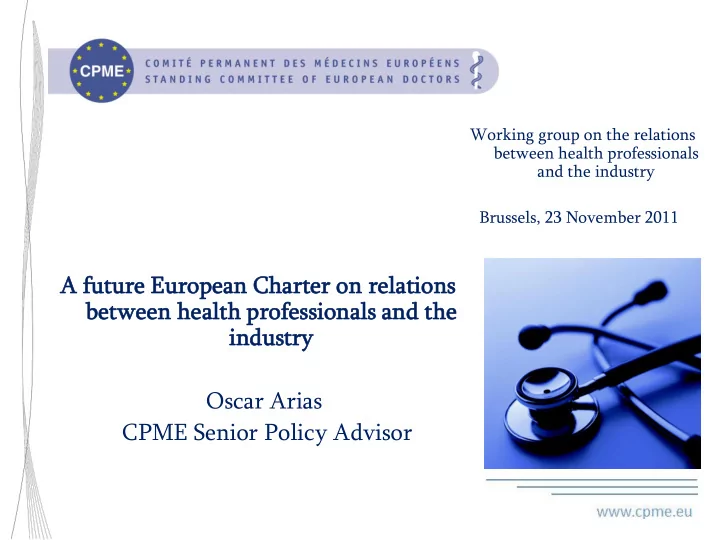

Working group on the relations between health professionals and the industry Brussels, 23 November 2011 A future ure European pean Charter ter on relatio ations s between tween health lth pr profess fessio ionals nals and the industry ustry Oscar Arias CPME Senior Policy Advisor
Current situation at European and National Level • Joint Declaration CPME-EFPIA on the cooperation between the Medical Profession and the Pharmaceutical Industry (2005) • 9 national Codes of Conduct signed by CPME members • Non-exhaustive list of 11 of the most relevant Codes of Conduct developed by the pharmaceutical and medical technologies industries Findings: • Diversity of length and content • Common features, common values & principles • Low awareness • Divergence of monitoring criteria/quality • Examples of best practices in particular in Finland, the Netherlands, Sweden and the UK
Codes that regulate the relations between health lth-pr profess fession ionals als and in industry ry In addition to the “ Joint Declaration of CPME and EFPIA on the cooperation between the Medical Profession and the Pharmaceutical Industry ”, most of CPME national members have additional Codes of Conduct currently in use, most often with a binding force: • Norway • Austria • Switzerland • Belgium • Sweden • Finland • Denmark • Germany • UK
Codes that regulate the relations between in industry ry and health-pr profess fession ionals als The following Codes es of Conduc uct t have e been en devel elope oped d mainly ly by the industry: try: • Eurordis Policy on Financial Support by Commercial Companies • The EuropaBio Core Ethical Value • EGA Code of Conduct Concerning the Promotion of Medicinal Products • EFPIA Code on the Promotion of Prescription – only Medicines to, and Interactions with Healthcare Professionals, and the Questions and Answers document concerning articles 9 & 10 • EFPIA Leadership Statement • PhRMA Code on Interactions with Healthcare Professionals • AdvaMed Code of Ethics on Interactions with Health Care Professionals • COCIR code of conduct on interactions with healthcare professionals • AESGP Guidelines for the advertising and promotion of non-prescription medicinal products to the public and to health professionals Additionally, at US level: • AMA Code of Medical Ethics
Common ob objectiv ives s an and purp rpos oses es of the codes: Transpar parency ency: • Guidelines on the product information that needs to be made available to the health professionals • Financial transparency (concerning: sponsorships, donations, grants, research funding, gifts and samples, educational seminars, events and hospitality) • Disclosure of conflicts of interests Ethic ical l guideli lines: es: • For the cooperation between the industry and the health professionals that are conducting clinical research • Guiding ethical principles for promotion, advertisement and marketing
Examples of be best practice ices (I) • The Finnish ish Medical Association has issued its own ethical guidelines on the relationship between doctors / industry and has designated in the self-regu gulatory atory system m own supervisory visory bodies: – a „Monitoring Board; and – a “Trust Council” that has a mandate to give sanctions in case of breach to the codes. • In addition, principles on product information and promotion of approved medicines are regulated by Medicines Act (395/1987) and Medicines Decree (693/1987) • In Swede den there is a self regulation that handles all marketing activities directed both to health care personnel and patients. It consists of three bodies: – the Pharmaceutical Industry's Information Examiner (IGM) – the Information Practices Committee (NBL) – LIF Compliance Officer (CO)
Examples of be best practice ices (II) In the United ed Kingdom • The Pharmaceutical Industry elaborated the code Prescription Medicines Code of Practice Authority (PMCPA) and the Royal College of Physicians published two codes of conduct in 2006: “Guiding Principles for Pharmaceutical Physicians” and “Ethics of Pharmaceutical Medicine” • Additionally, the Medicines and Health Products Regulatory Agency is an executive agency of the Department of Health that assesses and reports on the safety of medicines and medical devices and provides guidance and regulation that are reunited in the “ Blue Guide on the advertising and promotion of medicines in the UK” and in the annual reports • Also in the U.K. the Nursing and Midwifery Council Professional Conduct Code promotes standards for conduct, performance and ethics and there are also codes of conduct for student – industry relations • Complaints and cases brought under the code of practice are published in the PMCPA Code of Practice Review
Pr Proposed posed content ent for r our ur cha hart rter er: I) I) Core body of principles and values: • Product information that should be made accessible • Promotion, marketing and advertizing • Receiving benefits proportionality to the service, receiving medical samples, dining, entertainment, events, hospitality and payment for accompanying persons • Donations or grants for medical education, healthcare or research • Clinical Research • Consultants and Affiliation
II) II) Potential ad additi itional onal ar areas as: • Monitoring of Professional Congresses • Disclosure of payments to healthcare professionals • Payments for product application studies • The communication with health professionals by using new technologies (ex. social networking, e-health portals) and the distinction between providing information and advertising • Control and access to complaints
III) Mo Monit itor orin ing and Enfor orcem ement ent of the codes: • The existing European and national legislation will prevail over the Charter • Monitoring and enforcement can best be addressed and effectively reinforced at national level • Provision of incentives for the implementation of the principles of the Charter: – National/EU registries – National/EU website – Logo – Others
Thank you for your attention Oscar Arias CPME Senior Policy Advisor oscar.arias@cpme.eu Standing Committee of European Doctors Rue Guimard 15, 1040 – Brussels, Belgium Tel: +32 2 732 72 02 www.cpme.eu
Recommend
More recommend